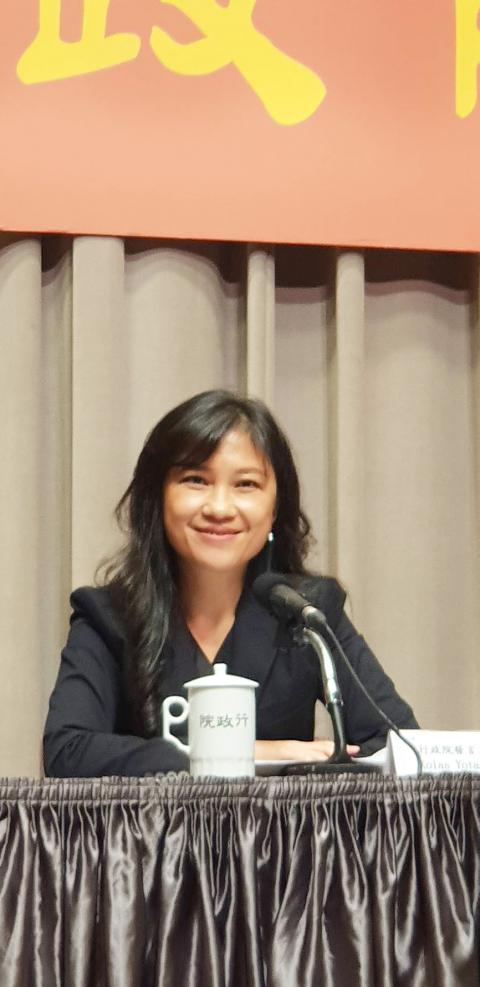Premier William Lai (賴清德) will next year present clear-cut goals for the government’s plan to make English a second official language, Executive Yuan spokeswoman Kolas Yotaka said yesterday.
The Ministry of Education will present an official report to Lai in the next few weeks on its recommendations for adopting English as an official language alongside Mandarin, Kolas said, after Lai discussed the issue in an interview with the Chinese-language Economic Daily News published yesterday.
“I will set a policy goal next year to make Taiwan a bilingual country, with English and Chinese being its official languages,” Lai said in the interview.

Photo: Lee Hsin-fang, Taipei Times
Lai late last year directed the ministry to form a “Committee to Promote English as an Official Language,” which was tasked with studying the issue, carrying out public surveys and drafting a plan on how to achieve the goal.
The ministry submitted the committee’s first report to Lai in June and is expected to present the second and final one by the end of this week or early next month, Kolas said.
The second report is to focus on ways and means of improving English teaching in schools, including establishing bilingual schools or classes and emphasizing spoken English, she said.
It will also deal with legislative issues such as the feasibility of deregulation to help promote a broad bilingual environment, Kolas said.
Earlier this year, then-minister of education Pan Wen-chung (潘文忠) told the Central News Agency in an interview that English competence did not equate to competitiveness, but it lays a foundation on which people can collect accurate information in a timely way, showcase professional expertise or express ideas without language barriers in the international arena, giving them a competitive edge.
“English proficiency opens up opportunities for young people,” Pan said. “We must do this for the next generation.”
Lai, who initiated a similar program in Tainan when he was mayor, has spearheaded the push to make English an official national language.

CHAOS: Iranians took to the streets playing celebratory music after reports of Khamenei’s death on Saturday, while mourners also gathered in Tehran yesterday Iranian Supreme Leader Ayatollah Ali Khamenei was killed in a major attack on Iran launched by Israel and the US, throwing the future of the Islamic republic into doubt and raising the risk of regional instability. Iranian state television and the state-run IRNA news agency announced the 86-year-old’s death early yesterday. US President Donald Trump said it gave Iranians their “greatest chance” to “take back” their country. The announcements came after a joint US and Israeli aerial bombardment that targeted Iranian military and governmental sites. Trump said the “heavy and pinpoint bombing” would continue through the week or as long

TRUST: The KMT said it respected the US’ timing and considerations, and hoped it would continue to honor its commitments to helping Taiwan bolster its defenses and deterrence US President Donald Trump is delaying a multibillion-dollar arms sale to Taiwan to ensure his visit to Beijing is successful, a New York Times report said. The weapons sales package has stalled in the US Department of State, the report said, citing US officials it did not identify. The White House has told agencies not to push forward ahead of Trump’s meeting with Chinese President Xi Jinping (習近平), it said. The two last month held a phone call to discuss trade and geopolitical flashpoints ahead of the summit. Xi raised the Taiwan issue and urged the US to handle arms sales to

State-run CPC Corp, Taiwan (CPC, 台灣中油) yesterday said that it had confirmed on Saturday night with its liquefied natural gas (LNG) and crude oil suppliers that shipments are proceeding as scheduled and that domestic supplies remain unaffected. The CPC yesterday announced the gasoline and diesel prices will rise by NT$0.2 and NT$0.4 per liter, respectively, starting Monday, citing Middle East tensions and blizzards in the eastern United States. CPC also iterated it has been reducing the proportion of crude oil imports from the Middle East and diversifying its supply sources in the past few years in response to geopolitical risks, expanding

Pro-democracy media tycoon Jimmy Lai’s (黎智英) fraud conviction and prison sentence were yesterday overturned by a Hong Kong court, in a surprise legal decision that comes soon after Lai was jailed for 20 years on a separate national security charge. Judges Jeremy Poon (潘兆初), Anthea Pang (彭寶琴) and Derek Pang (彭偉昌) said in the judgement that they allowed the appeal from Lai, and another defendant in the case, to proceed, as a lower court judge had “erred.” “The Court of Appeal gave them leave to appeal against their conviction, allowed their appeals, quashed the convictions and set aside the sentences,” the judges